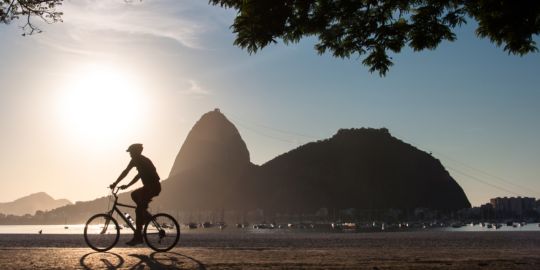Hello Everyone,
I am Romina, and I am a Certified Coach working online.
I am working on a project for ex-pats and digital nomads, and I need your help!!!
I am investigating on the major challenges for expatriates and digital nomads
Please post what are or have been the major challenges/difficulties as an expatriate or a traveller during your stay.
I have lived for about 7 years in Pakistan, and for me, the challenges and difficulties have been countless, but I guess the biggest one has been to adapt the European work rate to the local one. I was a director in a private company, and It's been really a challenge for me, but I have learned a lot about myself and my leadership, especially about uncertainty and how to deal with that in my life.
Could you please write:
The Country where have you been/you are
Your work position
The challenge/difficulty
If you have overcome it/ are still facing the challenge
what have you learned/what you wish
Thank you very much for your contribution.
Challenges as an expatriate
Hey there... Hi
I think the replies don't flow to your topic in mass because what you are asking is like Personal Data identification labeling.
Also, there is the art of negotiation, I would think I am not helping anyone by posting about my unsolved struggles.
In any case, I think there are the work related struggles, the family struggles, and the travel document struggles. Bread and butter of expat life.
...about learning something out of it, I would say that at the moment we are living a global transition episode and the class is not over yet...
best regards
I spent almost a year in Lima, Peru. I was dealing with medical and dental issues at the time and needed plenty of sleep. I was staying at hotels in Miraflores sector not far from Parque Kennedy.
I moved hotels about once a month because the noise from a specific source was disturbing me continually in each hotel, causing insomnia because of medical-related sensitivity to noise.
The noise -- and this is no joke -- was from the sound of doors slamming. The hotels use key-cards that apparently require heavy boxes attached to the doors to accommodate the utility of the key-cards.
No matter how softly the nearby guests try to close their guest room doors, the boxes typically cause loud slams, potentially disturbing sleep. As various guests sleep at varying hours, these noises can occur at any time of night or day.
The solution going forward may be to stay when traveling at AirBNB's that do not use these hotel-type doors. A positive factor is that the areas outside the front door at my Quito condo are generally tranquil. Early 20th-century-style keys are used to enter the apartments, not the weighty card-ready boxes that cause doors to pack a punch.
I do not consider this problem to be limited to hotels in Peru.
I am currently at a non-hotel apartment while on an extended stay .. and my sleep has not been disturbed here even once, for weeks. I believe part of the improvement has been that, with improved health, my sensitivity to night-time noise has decreased.
cccmedia
I am manager of industrial facilities erection projects and the countries I worked in are in my profile.
My biggest challenge was getting used to and adapting to the local ways without judging or comparing with my home or other places I knew. Also, staying positive was sometimes difficult, although an indispensable necessity for a successful stay.
Interesting question @wgirl...
I think digital nomads are typically looking to live in a nicer/cheaper jurisdiction, while still being able to work in high cost countries (or, perhaps more correctly, for employers in high paying countries) via web-enabled home working.
I do mostly teaching/tutoring, a little bit in local schools if they want me... or online via Zoom/Skype lessons. Usually UK/US/China. I also do a bit of remote technology marketing/copywriting via freelancing sites (UK/US/Canada).
So, I am currently in Bulgaria...
And: No challenges! It's easy-peasy! :-)
* Ticks the box on low cost: the cost of property is relatively low, while the cost of living is very low. Also has low income tax (10% flat tax).
* Ticks the box on good connectivity. My village has fiber internet, which comes in to my router (not to the street outside). I recently invested in a gigabit router so now I have 80 mbps wifi.
* Ticks the box for plenty of nice scenery and decent places to live. I live in nice locations (city/village/ski resort), which is a consequence of the low property cost (swapped a small UK house with tiny garden for a village house with a large walled garden, and two studio apartments).
* Even though it's a low-cost location, it's is very quiet and safe. I feel very relaxed here.
* Bureaucratic processes (such as resident permit, driving license, social security) not super difficult to navigate. And as professional fees are very reasonable, I can have an attorney or translator help me if needed. It would be easier if I learned Bulgarian, but hasn't been a huge issue for me. (With the fall of communism, schools swapped from teaching Russian to English as the second language, so most younger folks have a bit of English.)
* Even though I'm the local gringo, nobody comes round and hits me up for money, or tries to run some kind of scam. My builder and mechanic are helpful and treat me fairly. My neighbors are always very friendly, and often offer fresh fruit and veg from their gardens. (The village is popular, so many of the locals have much nicer houses and cars than me, so it means I'm quite low profile here, instead of sticking out like a sore expat thumb.)
* For in-person English classes, my school only pays me 12 leva/hour (6 euros), and this doesn't include commute time or hanging around time when the lessons aren't consecutive. I enjoy the change of scene, but it's not hard to beat this pay rate teaching remotely!
* Overall, exactly what I wanted as a nomad: better quality of life at lower cost, while still being able to generate a bit of an income. And, actually, I can pay my bills doing 10 hours or so per month, so I'm not under any pressure at all. I have pretty much a stress-free life these days... lucky me. :-) (Although it's making me very lazy: I'd rather watch YouTube or go for a mountain bike ride than do lessons.)
* I'm not retired yet, but I'm entitled to a full UK state pension. This is about 700 euros a month, which should come in handy. (A company/private one would be significantly higher.) The Bulgaria minimum pension is 125 euros/month, while the minimum wage is 300 euros/month. This gives an indication of the living cost here, and shows that retirees can live quite comfortably.
* As a side effect of the low cost (and Covid lockdown encouraging online purchasing), I've bought a couple of "luxury" items: instead of the bad old days of going to Starbucks for a £3 coffee, I bought one of those bean-to-cup machines (it makes delicious coffee!)... and IPTV so I can watch USA & UK TV... and a Xiaomi robo vacuum ("I have finished the clean, I am returning to charger now")... and a cross-country turbo e-scooter for trips into town. :-)
good day,
i am currently in the Kingdom of Saudi Arabia... i have been in and out of the country for about 8 years...
my current job position is on the engineering side specifically AutoCAD draftsman.
as for the challenges, there are a lot of it. first thing is the most obvious, language barrier. Not all local people here cannot speak english. For them to understand you, you need to learn their language not the other way around. very tricky at the beginning but eventually when you get a hang of it, word by word you learn, you can actually create a sentence then you can start communicating with them.
once you manage to learn the "arabic" language, most of the times you will be staying in the Kingdom will be much much easier.
another challenge i have encountered was the unequal treatment between arab people and us expats... i have said it based on my personal experience. one good example is the law that binds us from the employer. arab people can go freely find better opportunity but for us expats, we are bound by a contract and after each contract, we cannot choose to find jobs but instead we are forced to work beyond the agreed time frame (normally 2 years) and then issued and exit visa then sent to home country.
there are still some other challenges as we go along. some are mundane, and some are overwhelming.
the only thing to do to stay in this country is to adjust and to adapt.... 8 years is a long time for others, but for me its the normal thing ...
Thank you all for your interesting feedback
As I have received feedback that my questions could have been too specific for privacy, please feel free to write about your challenges in whatever way you feel more comfortable and thank you so much for your help.










